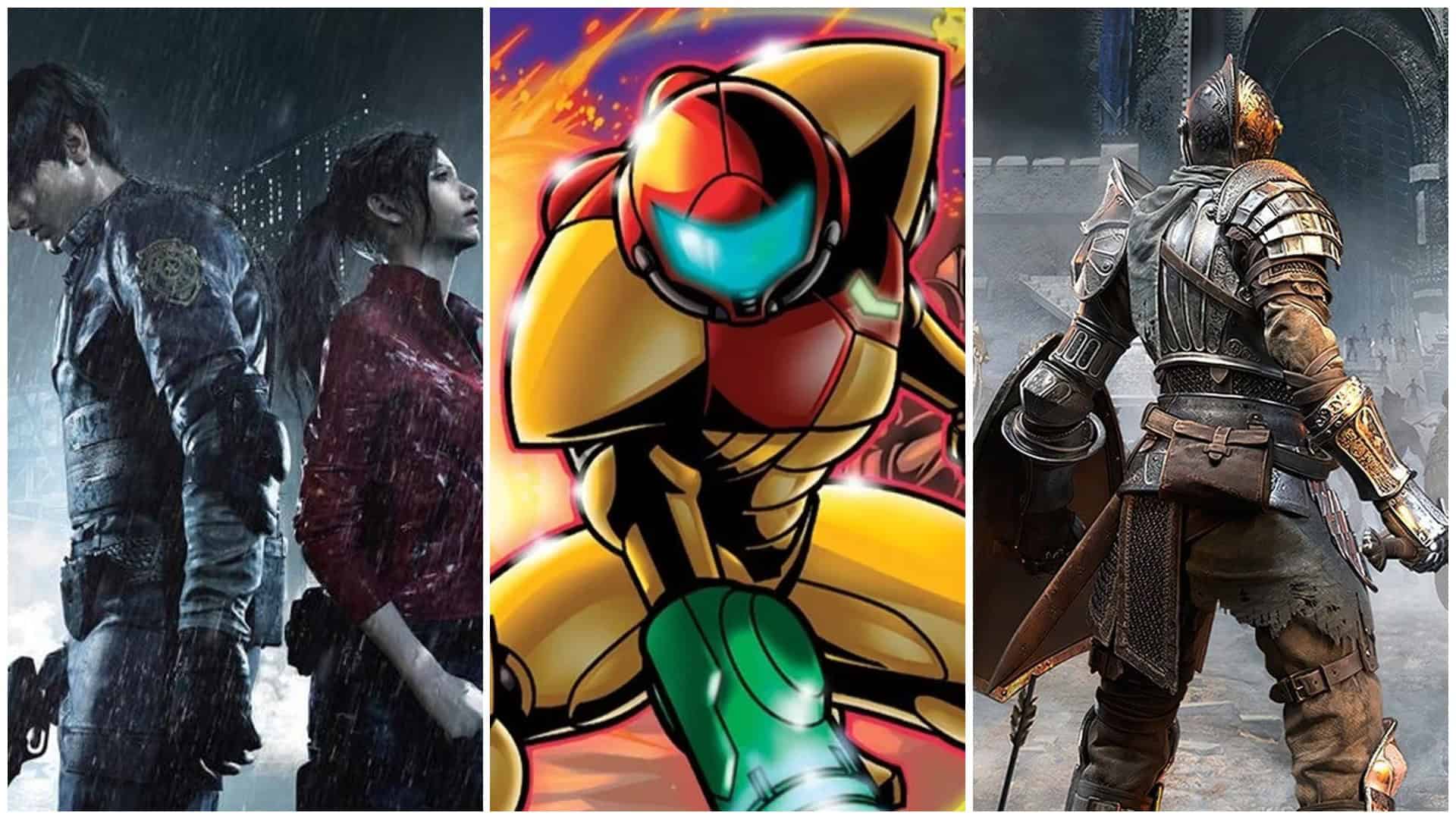Gamers like to claim that the modern prevalence of high-profile video game remakes is a result of studios no longer having any original ideas, but the truth is that remaking classic games has always been a tradition within the games industry. Video game remakes have been around almost as long as the medium itself, with arcade coin-op classics like Frogger, Defender, Space Invaders, and many others receiving remakes as early as the mid-1980s. That said, we are in the full swing of a modern-day renaissance of video game remakes, with many of the best video game remakes now capable of fully surpassing their source material to take on a life of their own. The greatest video game remakes don’t just give classic titles a visual upgrade and call it a day, though some understand it’s not worth fixing what isn’t broken.
In most cases, the best video game remakes are titles that reimagine some of the most beloved games in history for a modern audience. Many of the titles on this list’s original versions are just as fun and compelling to play today as they were at launch. These games’ remakes shine in honoring the essence of what made those games special in the first place while injecting them with impressive audiovisual fidelity and a slew of quality-of-life features that most of us take for granted in modern titles. And, in the rarest of cases, a great video game remake completely reimagines the spirit of its original game to improve upon it in every way possible and become the definitive version of an all-time classic.
20. Super Mario RPG
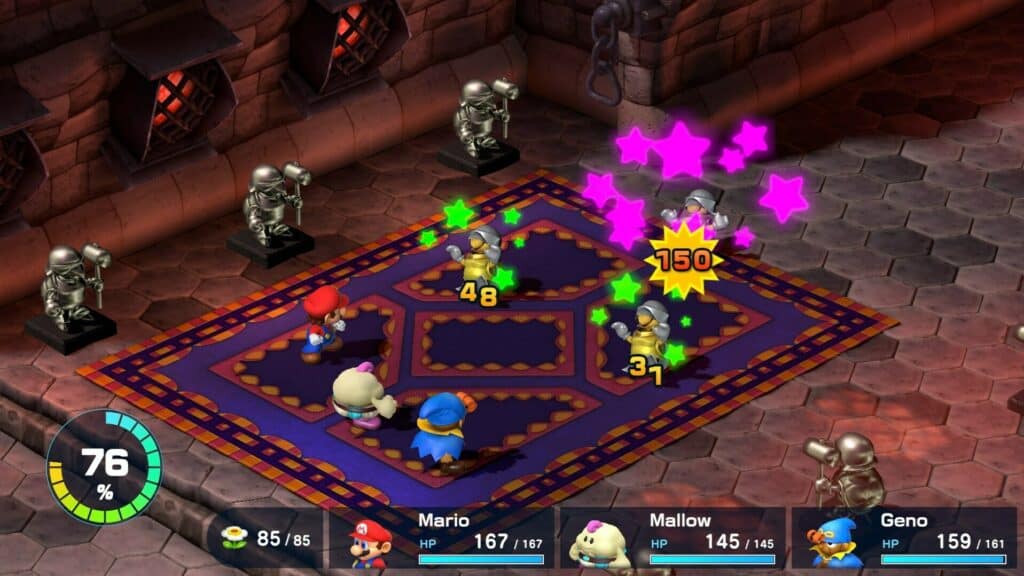
Sometimes a remake of a classic game comes from necessity as much as it does from a desire to see a title in a new light. Such is the case with Super Mario RPG, whose original game Super Mario RPG: Legend of the Seven Stars is one of the rarest cartridges on the SNES. With many players having missed out on the title thanks to its arrival late in the SNES’ lifespan and the limited digital re-release of the title, Super Mario RPG is a win for both fans of the original game and for game preservation as a whole. Nintendo wisely keeps much of the original game’s DNA intact in Super Mario RPG but gives it a fresh coat of paint that only serves to highlight its charming world and compelling characters even more.
The turn-based RPG mechanics on display in Super Mario RPG are pulled straight from the 16-bit Square Enix classics (which makes sense, given Square’s development of the original Super Mario RPG), and the humorous and lighthearted story is refreshing in comparison to most other JRPGs of the era. Further, Super Mario RPG (both the original and the remake) are much more forgiving and beginner-friendly than many other RPGs. Thanks to its accessibility and newfound widespread availability on the Switch, Super Mario RPG is in a perfect position to introduce an entire new generation to the wonder of great role-playing games.
19. Metroid: Samus Returns
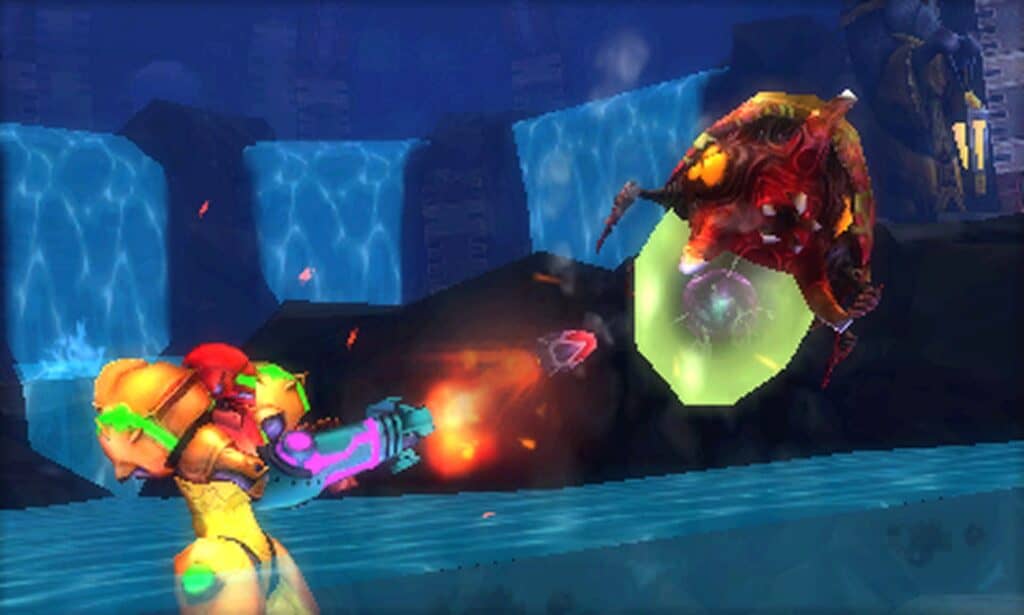
The original Metroid II: Samus Returns is one of the rare cases of a Metroid game that somehow fails to live up to the pedigree of the rest of the series. Truthfully, it’s a massive leap forward from the original Metroid, but it’s still far shy of the greatness that future entries would reach and mostly serves as a template for the legendary Super Metroid. Realizing that it had a well of untapped potential in the title, Nintendo and developer Mercury Steam collaborated on a ground-up remake of Metroid II with the incredible Metroid: Samus Returns. Not only does the remake of Metroid II correct one of that game’s biggest missteps (the lack of an overworld map and no diversity in environments), it also serves as the template for the developer’s future work on the incredible Metroid Dread.
Most importantly, Samus Returns is one of the greatest Metroidvania titles on the 3DS and a proper reimagining of a critically underplayed part of the Metroid saga. Metroid II‘s Game Boy exclusivity would result in many gamers passing it over in favor of new 16-bit experiences on the SNES. Thanks to Samus Returns, players have both a better version of a critical chapter in the galactic bounty hunter’s story and an excellent game that sticks out as one of the best 3DS exclusives.
18. Metal Gear Solid: The Twin Snakes
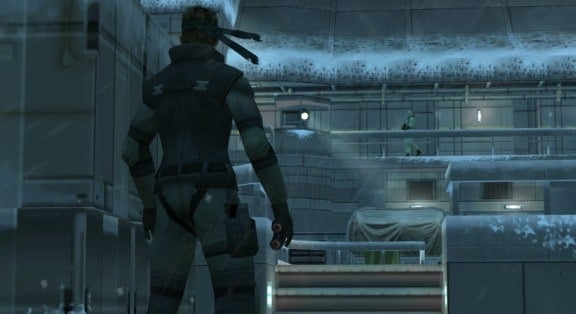
Despite the original game’s legendary status, Metal Gear Solid retains a high position on many gamers’ remake wish lists. What many forget, though, is that Metal Gear Solid already has a remake in the GameCube-exclusive Metal Gear Solid: The Twin Snakes. Rather than handle the development of the title in-house, Konami and Kojima Productions would pass on the direction of Twin Snakes to Silicon Knights. Ultimately, it’s Silicon Knights’ liberties with the source material that makes many Metal Gear purists swear off Twin Snakes, but the fact remains that it does an excellent job of reimagining Solid Snake’s infiltration of Shadow Moses in stunning graphical fidelity.
Tonal inconsistencies and changes in voice actors aside, Twin Snakes is still the solid stealth-action classic that fans remember from the PS1 Metal Gear Solid. One of the more important inclusions is Twin Snakes‘ use of a first-person option for firing weapons, which has the inadvertent effect of removing much of the challenge inherent in some of the game’s boss encounters. Most importantly, Twin Snakes shows that the core elements of Metal Gear Solid would make perfect fodder for a faithful modern-day remake of one of the PS1’s flagship titles.
17. Yakuza Kiwami 2
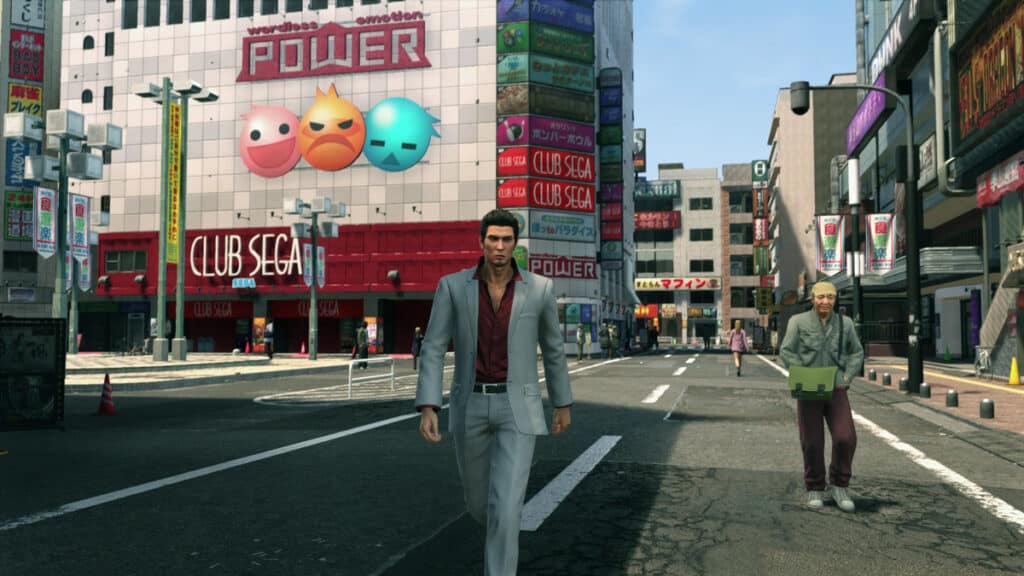
RGG Games’ Yakuza/Like a Dragon series is one of the greatest hybrids of open-world gameplay and action-RPG mechanics in all of gaming. With the series now having a total of 9 mainline entries (and 23 games in total if counting all the spin-offs and side games), it’s also one of the more prolific series under Sega’s umbrella. The Kiwami remakes of the classic original Yakuza games are both great, but it’s the incredible Yakuza Kiwami 2 that stands as the best. Not only is Kiwami 2 the best remake in the series, it’s also the definitive version of Yakuza 2 and has a legitimate claim to being the best Yakuza game, period.
For those who have yet to play a Yakuza game, the basic premise is this: you take on the role of Kazuma Kiryu, a Yakuza enforcer with a heart of gold. The first several games in the series mix 3D beat ’em up action with simulation gameplay and open-world elements, providing just as much entertainment in the dalliances from the critical path as the main quest itself. Each game in the series presents an incredibly dense and detailed rendition of locations in Japan taking inspiration from their real-world counterparts, and Yakuza Kiwami 2 features both one of the series’ best open-world maps and some of its greatest combat and storytelling.
16. Final Fantasy IV
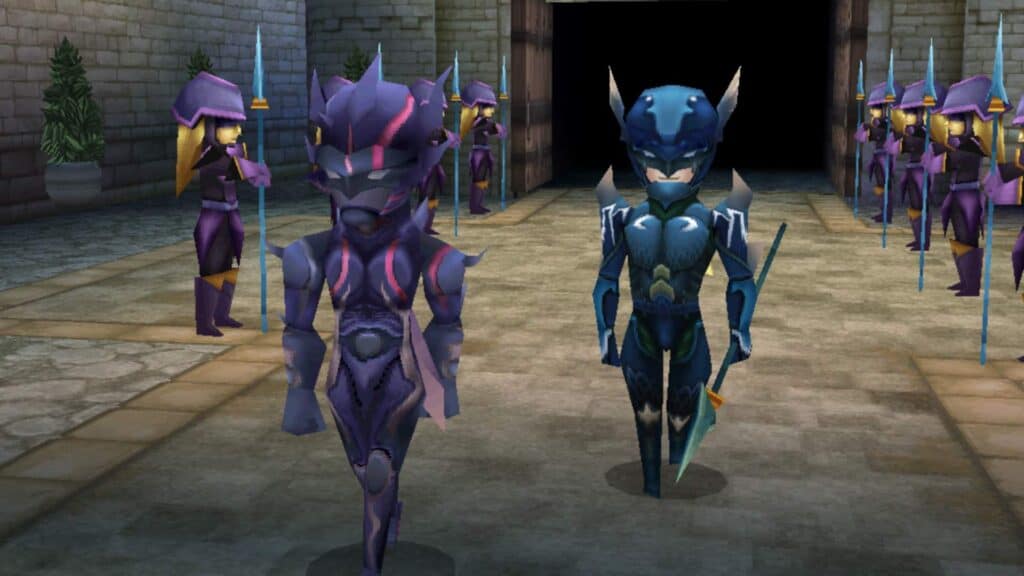
The current focus of the Final Fantasy series’ remakes is the fan-favorite Final Fantasy VII, but Square Enix’s previous remake of Final Fantasy IV is just as worth your time. After completely reimagining Final Fantasy III as a 3D game for the Nintendo DS, Square Enix would follow it up with a ground-up 3D remake of the Super Famicom/SNES classic Final Fantasy IV. Like Final Fantasy III, Final Fantasy IV maintains much of the core gameplay and story elements from the original game but reimagines the world and characters in full 3D, breathing new life into an aging classic. One of the more significant contributions that Final Fantasy IV makes to the game’s lore is the addition of some voice-acting, further rounding out the personalities of beloved series heroes and villains.
More than just a graphical upgrade, though, Final Fantasy IV‘s DS remake is notorious for two specific reasons. First, the game introduces the new Augment system where characters can inherit key abilities from past party members. Accordingly, this adds a significant new layer of strategy to the game’s turn-based battling. Second, Final Fantasy IV is one of the hardest games in the series, erring more on the side of the original Japanese release of Final Fantasy IV in terms of its balancing and difficulty as opposed to the SNES “easy type” version of Final Fantasy IV (Final Fantasy II on the SNES).
15. Star Ocean: The Second Story R
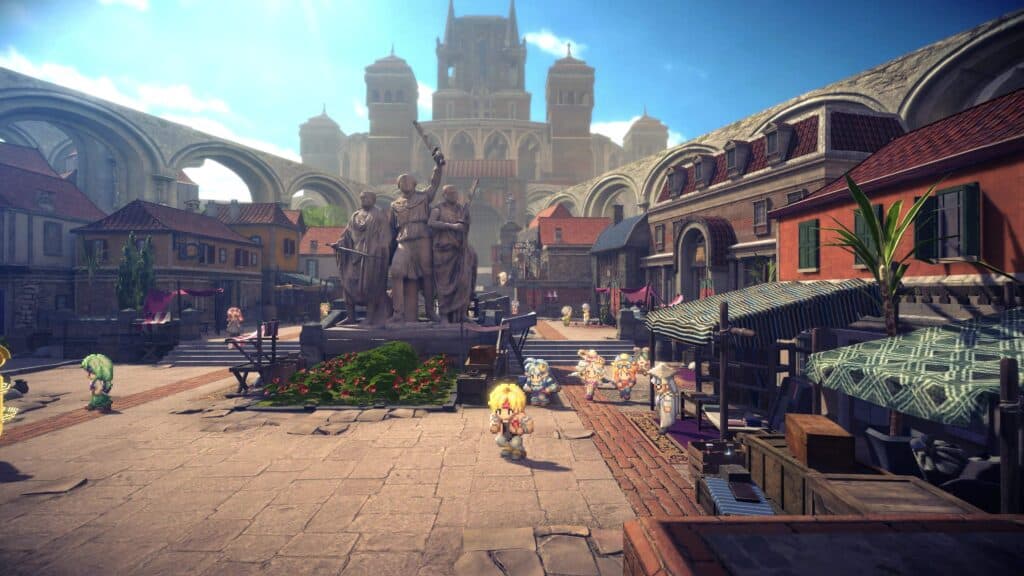
Speaking of excellent JRPG remakes from Square Enix, 2023’s Star Ocean: The Second Story R is an unmissable experience. Taking the foundation of the incredible PS1 classic Star Ocean: The Second Story, Second Story R maintains the charming 2D character sprites of the original but completely transforms the world and dungeons into sprawling and immersive environments rendered in full 3D. Additionally, the remake gives players much more agency in terms of their party of choice and how they build out each character thanks to unlocking the Talent system earlier than in the original. As a result, players can essentially get an insanely broken and overpowered party before even hitting the halfway point of the adventure with some careful grinding and Talent prioritization.
At its core, though, Star Ocean: The Second Story R is still the same classic JRPG that fans know and love. The original voice cast of the characters (both English and Japanese) return to reprise their lines from the script and the excellent soundtrack gets a full orchestral rendition, making Second Story R the definitive way to experience one of the greatest 32-bit JRPGs ever made.
14. The Legend of Zelda: Link’s Awakening
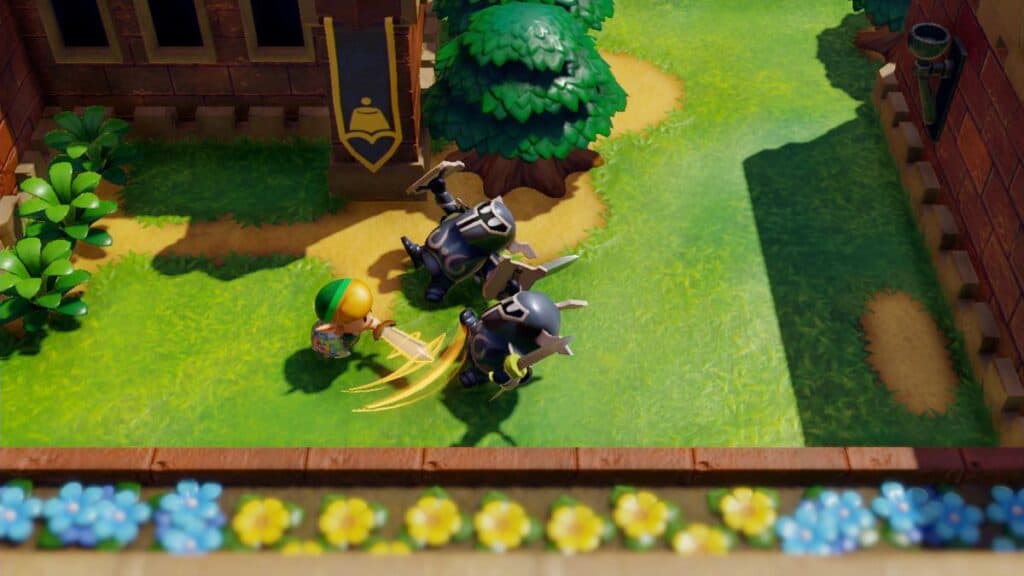
The surprise arrival of a full-blown Link’s Awakening remake on the Switch would end up being one of 2019’s best games and a great reimagining of an all-time classic. Long considered to be one of the best 2D games in the Zelda series, Link’s Awakening uses the foundation of A Link to the Past on SNES to tell a unique story that takes place well outside the realm of Hyrule. Washing ashore on the mysterious Koholint Island, Link must wake the slumbering Wind Fish to return to his homeland, despite the warnings that the island will cease to exist if he does so.
The original Link’s Awakening still holds up as one of the greatest Game Boy/Game Boy Color titles, and the remake contains everything from the Game Boy Color version (Link’s Awakening DX) and then some. The best improvement that the Switch remake of Link’s Awakening makes over the original is the addition of more face buttons for use in gameplay. The original’s limitation of using the Game Boy’s two-face buttons made item-swapping a cumbersome process where players needed to use the pause button and inventory screen to regularly switch out Link’s A and B Button item selections. Conversely, the Switch version now allows players to map items to the 4 face buttons while adding certain functionality to the bumpers and triggers for items that are almost always necessary (such as Roc’s Feather and the Pegasus Boots).
13. The Last of Us Part I
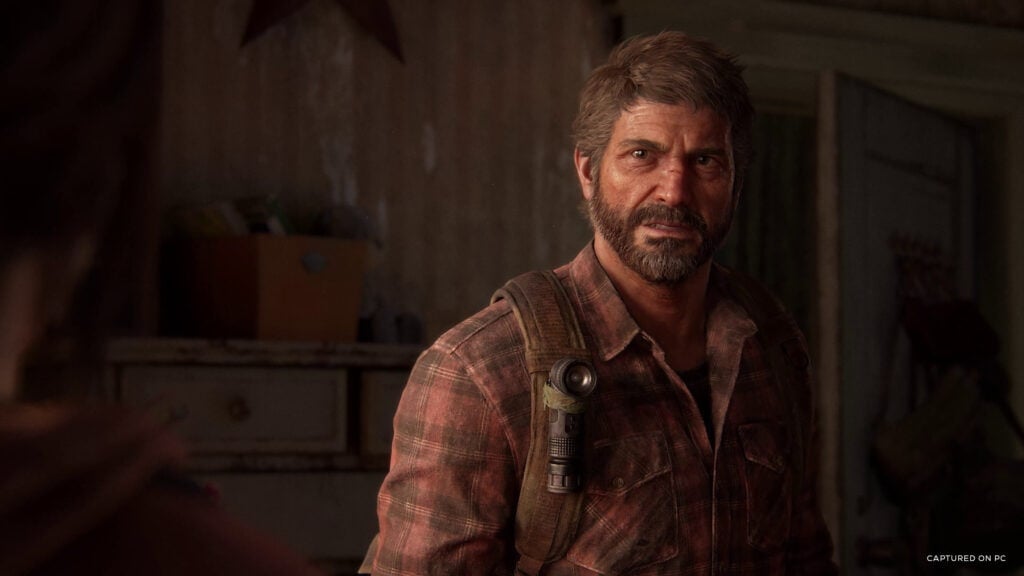
©The Last of Us Part I gameplay – License
While the controversy surrounding its launch did much to hinder the overall impact of the title, there’s little denying that The Last of Us Part I is a stunning technical achievement on Naughty Dog’s part. The uproar surrounding this remake of the PS3 classic is mostly due to its price point of $69.99, with many gamers feeling Sony should charge less for a third re-release of one of its most beloved first-party games. Wherever you happen to sit on the pricing debate over The Last of Us Part I, though, the game is still an incredible stealth-action experience with one of the all-time greatest narratives in gaming. And, considering the major graphical improvements the remake makes over the original, it’s also arguably the definitive version of a modern-day gaming classic.
At its core, The Last of Us Part I is still the same game that players experienced way back in 2013 on the PlayStation 3. Notably, the one major component that is missing from the experience is the online multiplayer mode, which was supposed to receive its own standalone release as a live-service competitive multiplayer title from Naughty Dog. Now that the Last of Us multiplayer project is no more, players only have the single-player games to rely on for getting to experience Naughty Dog’s compelling vision of the post-apocalypse, and it’s never looked better than it does in The Last of Us Part I.
12. The Legend of Zelda: Majora’s Mask 3D
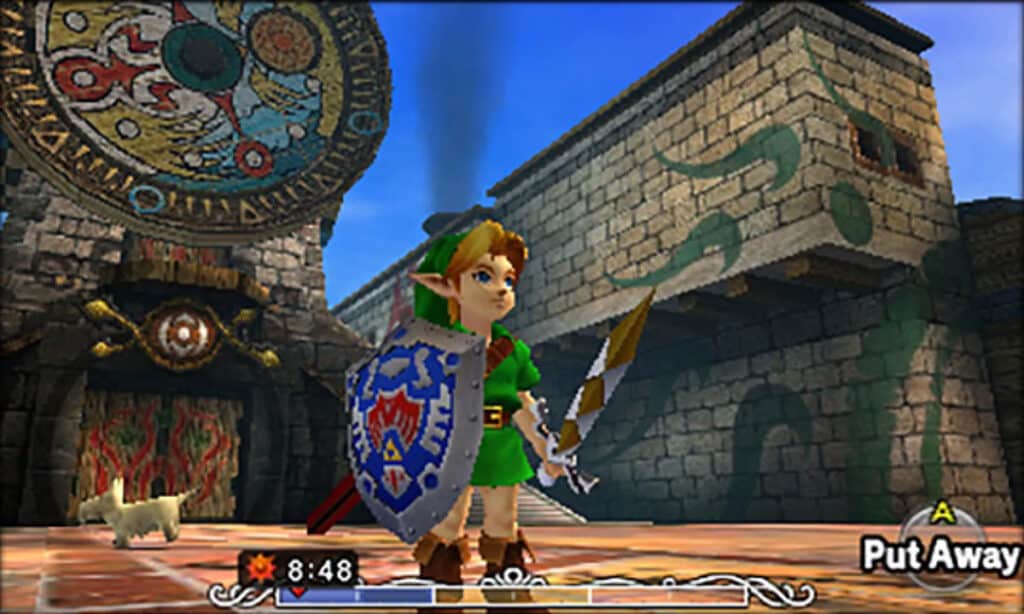
Majora’s Mask‘s place as a cult-classic Zelda title and one of the last first-party games on the Nintendo 64 meant that many players (for one reason or another) had never experienced this uniquely dark game in the series. Thanks to the 3DS remake of Majora’s Mask, not only do more players now have an understanding of what makes Majora’s Mask so special in the Zelda franchise, but they also have a version that looks astoundingly better than the original. Like the Ocarina of Time remakes on the 3DS, Majora’s Mask 3D sees both Nintendo and Grezzo collaborate on development duties, giving the game a visual overhaul and upgrades to its lighting effects, use of shadow, and textures while keeping the core gameplay intact.
However, unlike Ocarina of Time 3D (which is almost identical to its Nintendo 64 original), Majora’s Mask 3D adds some quality-of-life improvements that make the game’s time loop mechanic much easier to navigate. Primary among these is the change to the Song of Double Time, which allows players to skip ahead to any hour on a specific day rather than jumping ahead at 6-hour intervals. Considering that most of Majora’s Mask‘s major events and puzzles require very specific time frames of the 3-day window before the apocalypse, Majora’s Mask 3D is more forgiving when it comes to navigating and understanding the game’s unique implementation of an in-game clock.
11. Tony Hawk’s Pro Skater 1 + 2
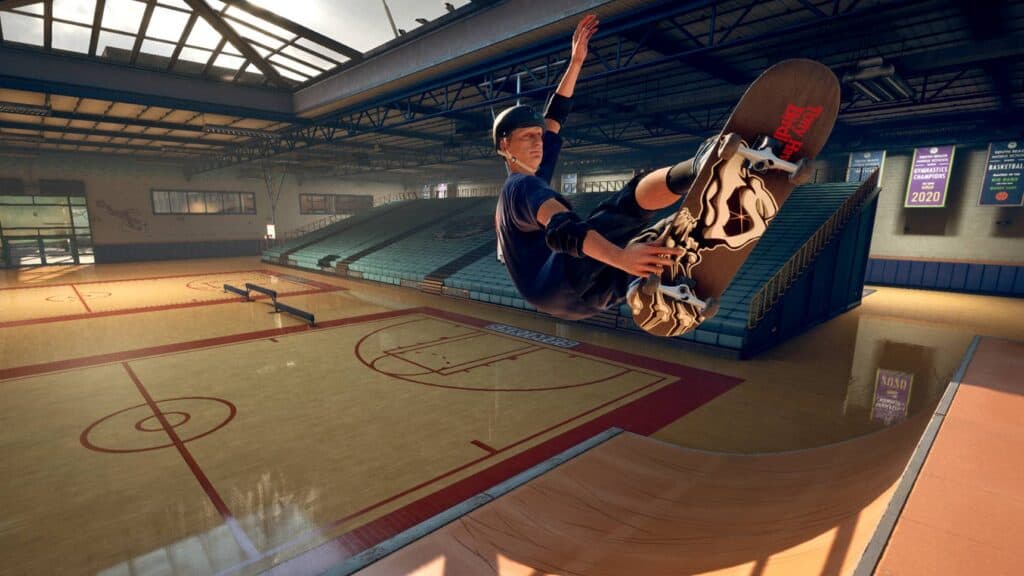
Both the original Tony Hawk’s Pro Skater and its sequel Tony Hawk’s Pro Skater 2 remain timeless PS1 classics, regardless of the franchise’s diminishing returns in later entries and eventual downfall. However, it’s still safe to say that both of those titles have not aged as gracefully as other PS1 games in terms of their visuals and character models. Remaking the first two THPS games as a combined package featuring all the skaters and stages from both (as well as the game-changing manual mechanic) is a stroke of genius, and the remakes are even better than players remember the originals.
Skateboarding games have come a long way since their original video game renditions, and even further since the release of the original Tony Hawk’s Pro Skater. Though series like Electronic Arts’ Skate might live on as one of the more realistic and mechanically deep versions of a skateboarding video game, it’s hard to argue against Tony Hawk’s Pro Skater being the most fun. The remake of the first two games in the series understands that fun is the most critical component of the THPS series, and it retains that aspect in spades. Playing Tony Hawk’s Pro Skater 1 + 2 is about as close as you can get to stepping into a time machine back to 1999.
10. Metroid: Zero Mission
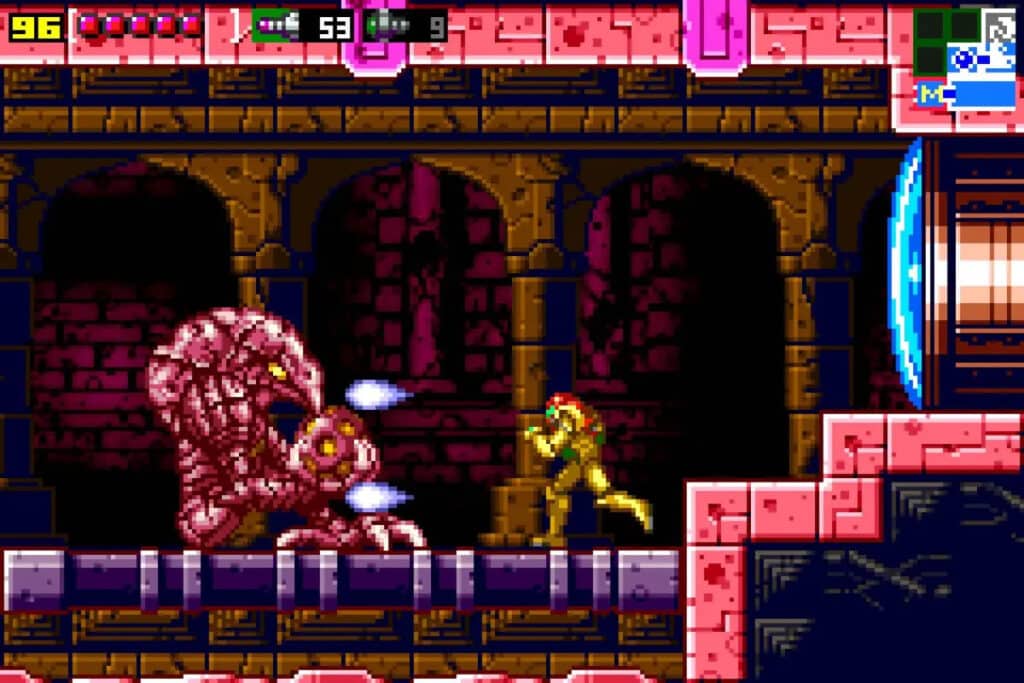
Ironically, the best video game remakes can sometimes do a great job of reminding players of the brilliance of the original title. Such is the case with Metroid: Zero Mission, which ends up being the best version of the original Metroid while also showcasing how brilliant its initial design is. The original Metroid‘s arrival on the NES would coincide with a time when most action platformers were level-based, linear experiences with finite character lives, a high score, and a game over screen. Truthfully, the first wave of action platformer titles on the NES weren’t all that different from their arcade counterparts. And then along came Metroid.
Metroid‘s large, interconnected map would help it to become one-half of the portmanteau for the Metroidvania subgenre, but later games in the series would improve upon and, in the case of Super Metroid, eventually perfect that formula. Metroid: Zero Mission‘s brilliance comes in its retelling of the events of Samus’ original adventure on Planet Zebes through the framework of Super Metroid. As a result, it takes a “best of both worlds” approach to one of gaming’s all-time classics and highlights what makes Metroid and its protagonist Samus Aran so special in the first place.
9. Dead Space
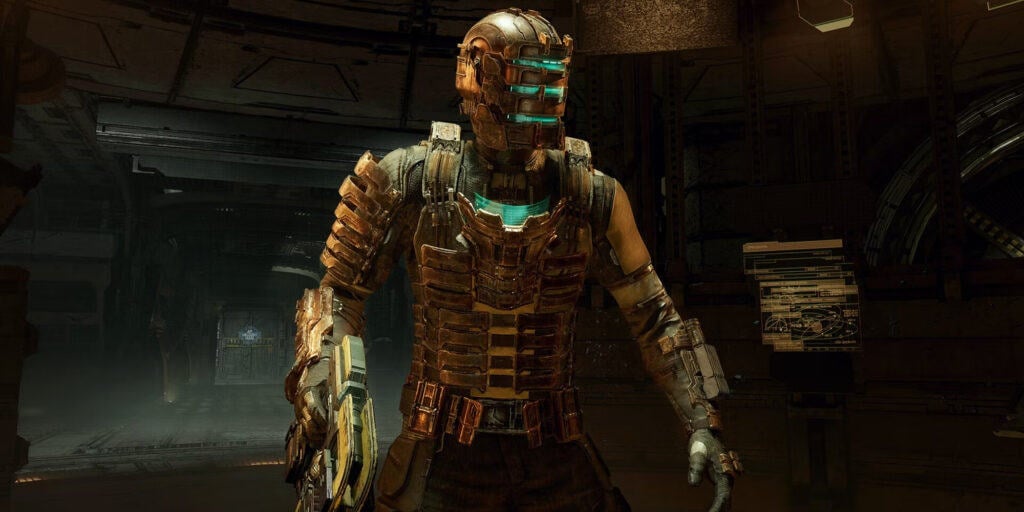
Similar to The Last of Us Part I, EA and Motive’s remake of survival-horror classic Dead Space excels by not fixing what isn’t broken. Other than a massive graphical overhaul and some smart subversion of players’ expectations based on their experience playing the original, Dead Space is still the same great game that many players remember. Sure, the audio design is more nuanced and the lighting is far more impressive (and oppressive for anyone with a fear of the dark), but the gameplay retains the core Resident Evil 4-inspired action/horror hybrid that fans experienced back in 2008.
One thing that Dead Space‘s remake does differently than the original is incorporate more of the franchise’s overarching lore into the game’s story. The Dead Space universe would eventually grow to include comics, novels, animated series, and spin-off games that each delve into the history of the mysterious Church of Unitology and its connection to the CEC and EarthGov. With that hindsight in tow, Dead Space‘s remake does a great job of incorporating more development to the cast of characters and story, adding gravity to an already compelling sci-fi/horror plot.
8. Final Fantasy VII Remake
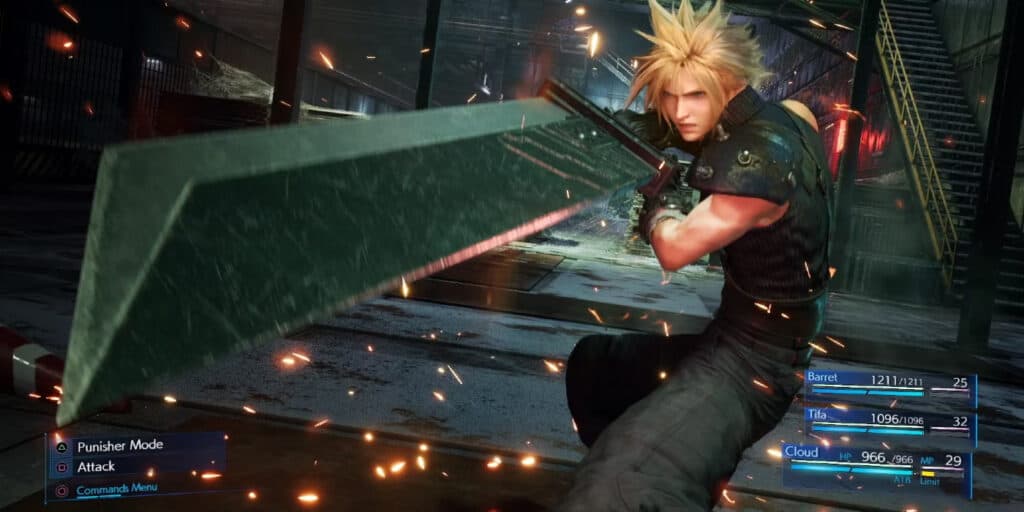
The promise of a Final Fantasy VII remake is something that players have been clamoring for for more than a decade, to where its official announcement and reveal in 2015 was met with teary-eyed reactions from fans. The importance of the original can’t be overstated, as its place as both the first 3D Final Fantasy and a PlayStation exclusive would help Sony win the 5th generation console wars and make the previously niche RPG series a household name. However, reverence for the original Final Fantasy VII makes nailing a remake of the game a tricky proposition, and Square Enix’s approach to how to handle that challenge is a stroke of genius.
Rather than faithfully adhering to the original Final Fantasy VII, the Final Fantasy VII Remake is the first chapter in a planned trilogy that strictly follows the heroes during the Midgar section of the original game. By expanding the scope and scale of the city of Midgar and taking what was originally just a few hours and stretching it out into 40, Final Fantasy VII Remake fleshes out the plot and characters of the original to feel like the original game Yoshinori Kitase envisioned more than 20 years prior. And, by shaking things up on the combat side but still retaining some of the strategy and nuance of the turn-based original, Final Fantasy VII Remake‘s combat strikes a perfect balance between Final Fantasy old and new.
7. Shadow of the Colossus
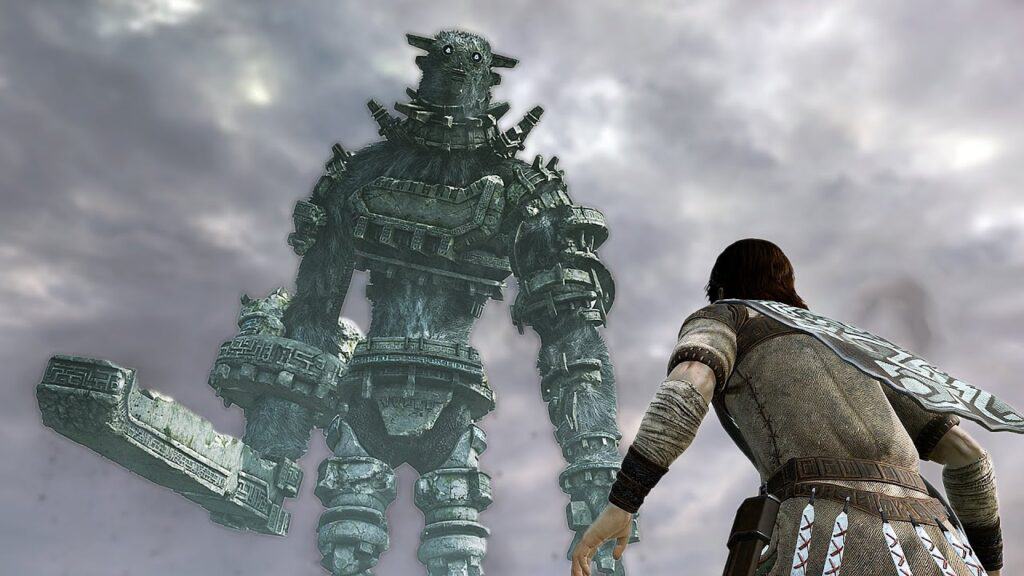
The original Shadow of the Colossus is one of the greatest PS2 games of all time and still holds up against modern titles, so the fact that the game received a remake is something of a surprise. However, the talented team at Bluepoint Games knocked it out of the park with their remake of Shadow of the Colossus, retaining the same sense of melancholy adventure that pervades throughout the original while adding several quality-of-life features and a nice sheen of graphical polish. The 2018 Shadow of the Colossus is a lesson in how to tastefully approach reimagining a game, and it ends up being one of the best video game remakes as a result.
Aside from the improvements made to visuals and performance, the 2018 version of Shadow of the Colossus reworks the original’s somewhat frustrating control scheme to become much more enjoyable. Other than those superficial changes, though, Bluepoint’s Shadow of the Colossus is as faithful to the original as a remake can be, with the gameplay and story remaining completely untouched. Ultimately, Shadow of the Colossus is less of a “remake” and more of a modern polish to a classic, becoming the definitive version of one of the PlayStation’s best titles.
6. Resident Evil 2
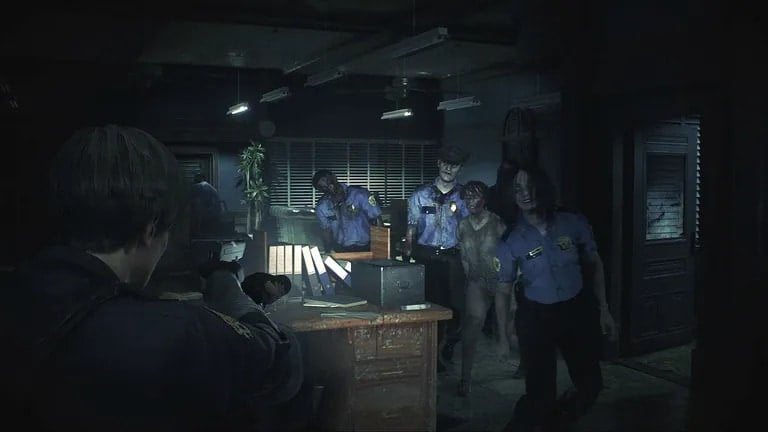
The gold standard for remakes in the Resident Evil series, Resident Evil 2 strikes a careful balance between being a faithful homage and a clever subversion of player expectation. The original Resident Evil remake on GameCube would establish a trend that Resident Evil 2 smartly follows, leaning more fully into the horror side of the franchise than the original and adding in meaningful surprises to punish players that rely too heavily on their nostalgia. What makes Resident Evil 2 one of the best video game remakes is its understanding of what players love about the original, and using that same spirit to create a version of the game that surpasses the original in every conceivable way.
Aside from the major graphical overhaul that 2019’s Resident Evil 2 gives the original, the title makes one surprising addition that completely recontextualizes how the first half of the game is played. Whereas the appearance of Mr. X was limited to the B Game of either Claire or Leon in the original Resident Evil 2, the hulking tyrant makes a surprise appearance as a persistent threat within the first hour or so of the remake. From then on, every bit of the game transforms into a deadly game of cat and mouse with an unkillable Terminator-like enemy, making Resident Evil 2 perhaps the most terrifying game in the long-running horror franchise.
5. Demon’s Souls
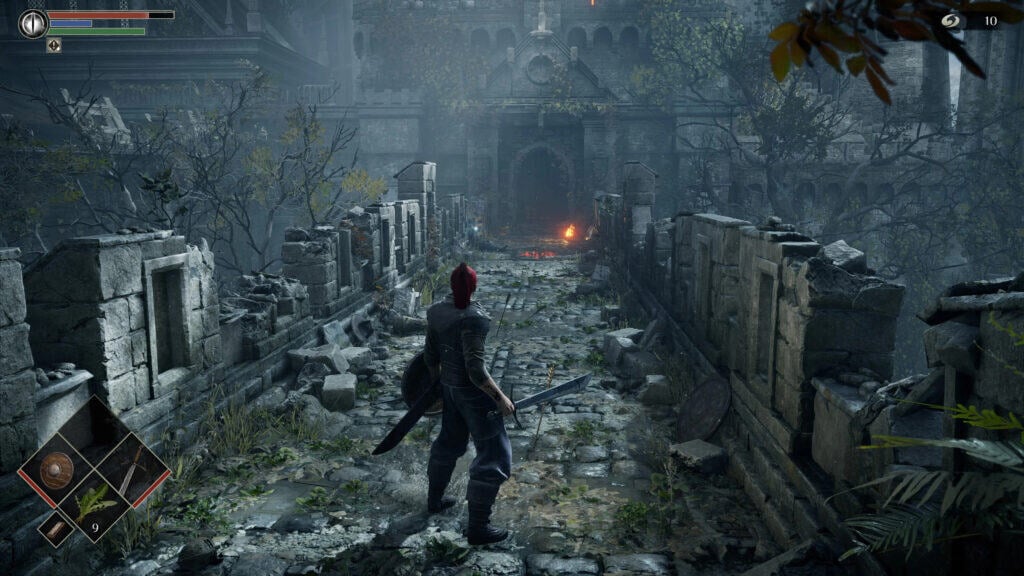
After its success with reinventing Shadow of the Colossus, Bluepoint games would strike gold a second time with a remake of the 2009 FromSoftware classic Demon’s Souls. The originator of the modern “Soulsborne” formula that FromSoftware is now known for, Demon’s Souls is an oppressively bleak and complex action RPG with more than a fair share of subtle and obtuse mechanics that intentionally punish the player for being hasty or unprepared. Bluepoint once again succeeds with the remake of FromSoftware’s PS3 classic by retaining the core gameplay of the original but giving it a massive audiovisual overhaul courtesy of the power of the PlayStation 5.
Some prefer the atmosphere and visual style of the original Demon’s Souls over the remake, claiming that Bluepoint’s treatment of the reimagined environments is too bright and lacks the character of FromSoftware’s initial vision. Still, there’s no denying that Demon’s Souls is perhaps the best-looking launch game of the PS5 and a showpiece for the console’s hardware. That a remake of a Soulsborne game ended up as a launch title for Sony’s 9th generation console is a testament to how much the subgenre has grown in the decade since the launch of the original Demon’s Souls.
4. Final Fantasy VII Rebirth
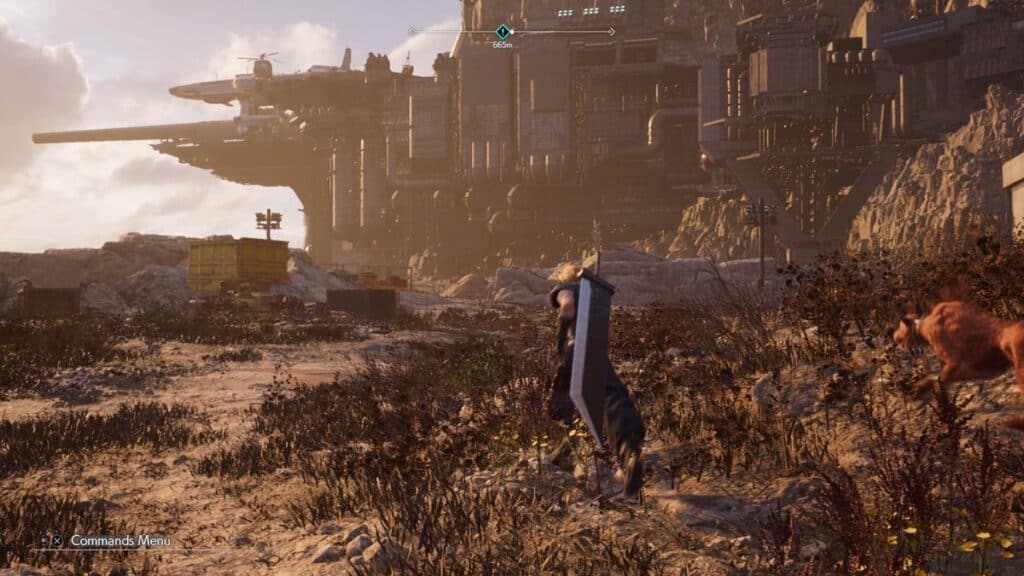
Taking the template of Final Fantasy VII Remake and branching out into the open world of Gaia, Final Fantasy VII Rebirth is a stunning achievement on several levels. First, the game continues the subtle branching off of the original’s narrative, allowing for some clever subversion of player expectation and surprising story twists that both enhance the remake and make the original even better in hindsight. Second, the game’s presentation is perhaps peerless on the PS5, presenting one of the most dense and beautiful open worlds to ever appear in a game, Final Fantasy or otherwise. Like its predecessor, Final Fantasy VII Rebirth treats its source material with the utmost respect and carefully straddles the line between homage and innovation to deliver a must-play experience in the Final Fantasy VII saga.
The main story aside, Rebirth also leans into some formulaic open-world design, but the world’s beauty and density help to ease some of the open-world fatigue that could have otherwise set in after a few hours. Additionally, Rebirth adds just enough new layers to the phenomenal turn-based/real-time hybrid model from Final Fantasy VII Remake to make it feel like it, and not its predecessor or Final Fantasy XVI, should be the gold standard of how to approach combat in the Final Fantasy series moving forward.
3. Resident Evil 4
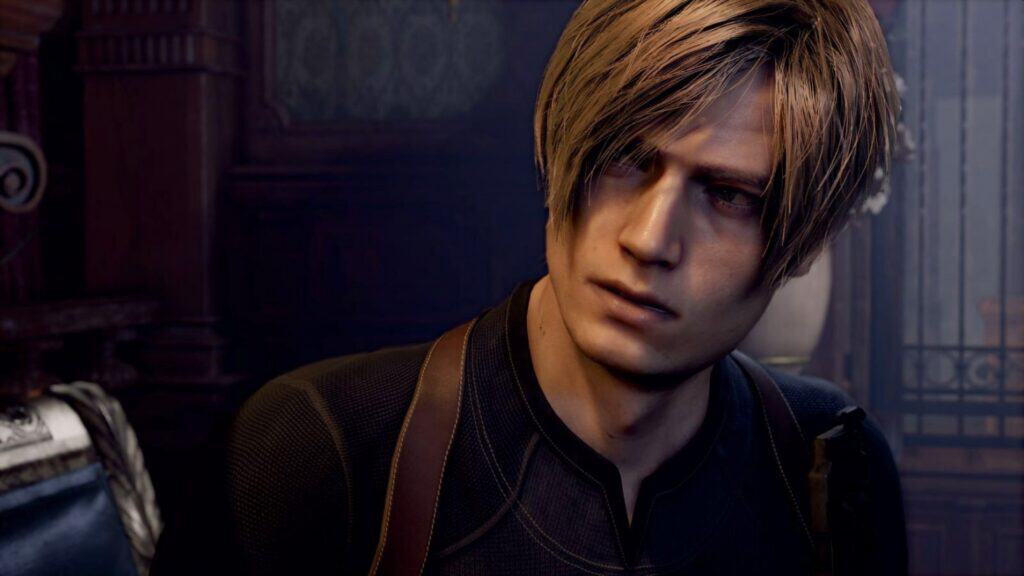
The success of Resident Evil 2 in 2019 would ultimately pave the way for Capcom to adopt a new release strategy for the Resident Evil franchise. In between new mainline entries in the series, Capcom would tackle reimagining one of the classic Resident Evil titles as an over-the-shoulder next-gen horror experience. Resident Evil 2 gave way to a remake of Resident Evil 3 just a year later, making the next candidate for the Remake treatment to be the now-legendary Resident Evil 4. And, after officially revealing in 2022, Resident Evil 4 would arrive in early 2023 to become one of the Game of the Year contenders and make a strong case for it potentially surpassing the original.
Like both Resident Evil 2 and Resident Evil 3, Resident Evil 4‘s remake remains mostly faithful to its source material while giving the game a massive graphical facelift. However, where Resident Evil 4 deviates from the original is in both its pacing and one of its key mechanics — being able to move and shoot at the same time. The original Resident Evil 4 made positioning Leon one of the major challenges in each encounter thanks to not being able to move and shoot at the same time, and the remake addresses adding the ability by counter-balancing it with the need to counter enemy attacks using the combat knife. As a result, Resident Evil 4‘s remake features some of the most white-knuckle encounters in the series and not only retains the greatness of the original but somehow elevates it.
2. The Legend of Zelda: Ocarina of Time 3D
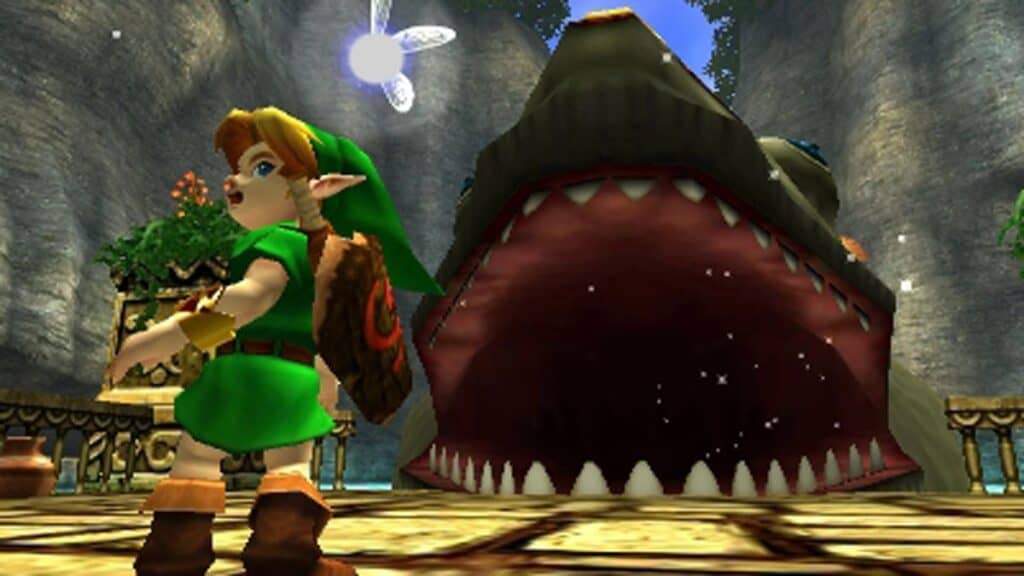
©The Legend of Zelda: Ocarina of Time 3D gameplay screenshot
How do you improve upon perfection? Well, the short answer is that you can’t, but that didn’t stop Nintendo and Grezzo from giving it the good college try with Ocarina of Time 3D on the Nintendo 3DS. Essentially, Ocarina of Time 3D is an incredible remake for how it subverts player expectations and nostalgia. The core of the game is identical to what players remember from playing the Nintendo 64 original, but the visuals and audio are given just enough of an upgrade so as to not feel anachronistic. Ultimately, Ocarina of Time 3D looks like how we remember the original Ocarina of Time, even though it’s a significant overhaul in terms of its lighting, textures, and colors.
However, Ocarina of Time 3D is still the same experience that many players had getting to play Zelda in 3D for the first time back in 1998. The ability for the game to still feel simultaneously timeless and ahead of its time, regardless of whether playing the original or the 3DS remake, is a testament to the magic of The Legend of Zelda and the importance of Ocarina of Time in particular. As far as remakes go, Ocarina of Time 3D more than understands the assignment by not messing with the elements and mechanics of the original and acting as a modern update to one of the most pivotal video games ever made.
1. Super Mario Advance 4: Super Mario Bros. 3
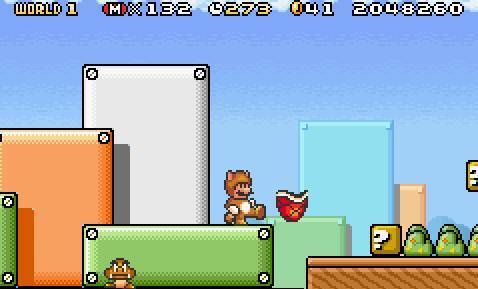
In terms of both its critical and commercial reception and the nuances of its design, Super Mario Bros. 3 is inarguably the greatest 2D platformer of all time. Shigeru Miyamoto’s brilliance as a game designer is on full display in Super Mario Bros. 3, and it stands as both the greatest game on the NES and is still somehow the bar by which all other platformers can be judged more than 30 years later. In terms of “perfect” games, Super Mario Bros. 3 is a legitimate contender, so it only makes sense that a remake of the title for the Game Boy Advance would land at the top of the list of best video game remakes.
More than just a 16-bit overhaul to the 8-bit classic Mario game, though, Super Mario Advance 4 has a trick up its sleeve that elevates it to a legendary status all its own. Thanks to the Game Boy Advance’s card-reader peripheral, the version of Super Mario Bros. 3 that features in Mario Advance 4 has several custom levels that push player skill to the ultimate limit. These levels would end up being one of the inspirations for the excellent Mario Maker series while also serving as a gateway to the complex world of Kaizo Mario levels.
The image featured at the top of this post is ©CheatCC/Matt Karoglou.
